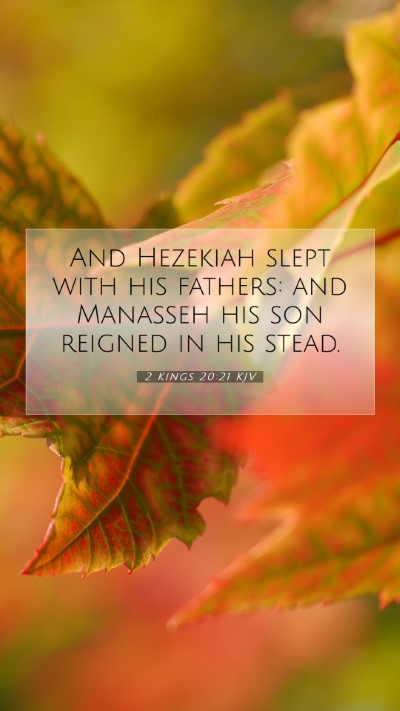Old Testament
Genesis Exodus Leviticus Numbers Deuteronomy Joshua Judges Ruth 1 Samuel 2 Samuel 1 Kings 2 Kings 1 Chronicles 2 Chronicles Ezra Nehemiah Esther Job Psalms Proverbs Ecclesiastes Song of Solomon Isaiah Jeremiah Lamentations Ezekiel Daniel Hosea Joel Amos Obadiah Jonah Micah Nahum Habakkuk Zephaniah Haggai Zechariah Malachi2 Kings 20:21 Meaning
What is the meaning of 2 Kings 20:21?
And Hezekiah slept with his fathers: and Manasseh his son reigned in his stead.
2 Kings 20:21 Bible Verse Meaning
Understanding 2 Kings 20:21: A Comprehensive Commentary
The verse 2 Kings 20:21 states, "And Hezekiah slept with his fathers: and Manasseh his son reigned in his stead." This brief yet profound passage signifies a pivotal moment in Judah's history, marking the transition of power from King Hezekiah to his son Manasseh. Here, we delve into the meaning of this verse by combining insights from public domain commentaries to illuminate its implications for our understanding of Scripture.
Bible Verse Meanings
The meaning of this Bible verse can be explored through various layers, including historical, theological, and practical perspectives.
Historical Context
Hezekiah was known for his religious reforms and trust in God, making significant efforts to restore proper worship in Judah. His reign was characterized by a resistance against foreign powers and deep reliance on divine guidance. The transition to Manasseh, however, is particularly significant as it introduces a stark contrast in leadership and influences the spiritual state of the nation.
Theological Insights
Matthew Henry notes that the peaceful sleep of Hezekiah with his fathers signifies the end of a righteous reign. He had lived his days in the faith of God, and his passing indicates the fulfillment of God's promise of longevity. In a theological sense, it prompts reflection on the continuity of God's covenant through generations and how leadership impacts a nation’s spiritual journey.
Spiritual Lessons
Albert Barnes highlights that the reign of Manasseh presents a drastic shift toward idolatry and disobedience against God. This serves as a warning of the potential for decline after a period of renewal when the next generation does not adhere to the legacy of faith established by preceding leaders. This calls for introspection about the importance of teaching and preserving the faith within the community.
The Role of Succession
Adam Clarke elaborates on the significance of succession in leadership, emphasizing that the qualities or faults of a leader can greatly influence the direction of a nation. Manasseh’s reign is marked by a significant turning away from God, emphasizing the necessity for each generation to personally embrace or reject faith.
Application of the Verse
How does this passage apply to our daily life and spiritual walk? Here are some insights:
- Legacy of Faith: The verse invites readers to consider the spiritual legacy they are leaving for future generations. It underscores the need for intentional discipleship and teaching of God's ways.
- Challenges of Leadership: Understanding the difference between Hezekiah's faithful reign and Manasseh's disobedience encourages contemplation of the impact that leaders can have on spiritual and moral decline.
- Cautionary Tale: Manasseh's reign serves as a reminder of how quickly a nation can fall away from God, prompting believers to remain vigilant in their faith and practice.
Related Bible Cross References
- 2 Kings 21: A further exploration of Manasseh's reign, illustrating the depth of his idolatry and the implications for Judah.
- 2 Chronicles 32:33: This passage provides additional insight into the later years of Hezekiah's life and his ultimate legacy.
- Isaiah 38-39: These chapters offer context regarding Hezekiah's health and his interactions with foreign powers, shaping his reign.
Conclusion
In summary, 2 Kings 20:21 encapsulates a critical moment in Jewish history, highlighting the transition from a faithful leader to one whose reign leads to spiritual decline. This understanding of Scripture, enriched by a blend of historical and theological commentary, serves to deepen our appreciation of the importance of faithful leadership and the ongoing legacy of faith in our communities.
As we engage in bible study groups, utilize bible study tools, and participate in online bible study, this verse offers profound insights into the relevance of leadership and spiritual obedience across generations. The significance of this biblical passage resonates in understanding how the actions of past leaders shape the faith of future generations.


